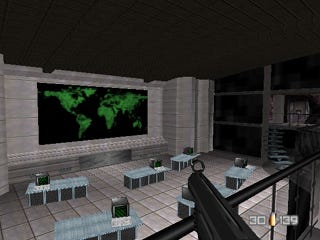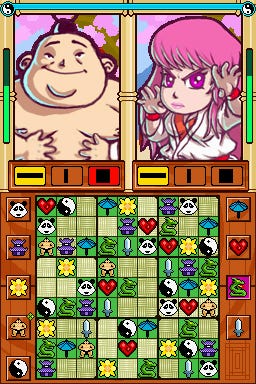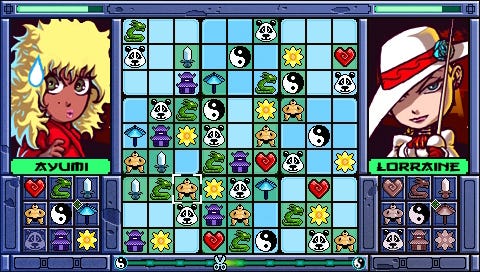Trending
Opinion: How will Project 2025 impact game developers?
The Heritage Foundation's manifesto for the possible next administration could do great harm to many, including large portions of the game development community.
Martin Hollis is best known as the creative force behind Rare's seminal GoldenEye for the Nintendo 64, and in this in-depth Gamasutra interview, he discusses its genesis, its quasi-sequel Perfect Dark, and Zendoku, the first commercial title from his seven year-old indie studio Zoonami.

In many ways, Martin Hollis is an example of the archetypal, slightly eccentric English developer. Starting out as a teenaged bedroom coder, he was Rare's first graduate programmer employee, working on the Killer Instinct coin-op before setting up and leading the 12-man team that created the seminal GoldenEye 007.
He left halfway through its quasi-sequel Perfect Dark, citing a combination of wanderlust and a lack of interest. He spent the next year traveling and consulting on GameCube's hardware development before returning to the UK. He eventually set up Zoonami, a small Cambridge-based studio in 2000, and after working on numerous secret research projects, its first game, Zendoku (DS/PSP), will be released in North America via Eidos this June.
OK, let's start at the beginning. How did Martin Hollis get into computer games?
Martin Hollis: It's funny. Even the people in the games business who are younger than me are getting old now. I'm 35. I've been in the business, more on than off, for 21 years, which is a long time by anyone's reckoning.
I used to program a BBC Micro - type in games. Do you remember that? I was ecstatic to get paid for writing a game. It meant I could upgrade my equipment but I never saw it as a career. Never considered it for a second. Back then my perspective was a job making games was about as sensible as joining the circus. So I went to university to do computer science [at Cambridge University]. Then I went to a little startup doing hardware and software, but that didn't enthuse me, so I applied for a job at Rare. I was their first computer science graduate.
 What was the atmosphere like back then?
What was the atmosphere like back then?
MH: The company was going through an enormous transition from PC to Silicon Graphics machines. Rare had had considerable financial success so it was able to pay cash, but the SGI equipment was fabulously expensive. Of course, as a 22-year-old, it was really cool. I was the guy who understood UNIX, so I ended up setting up the networks. We had a lot of good fun. Rare went from having three SGI machines to around 50 by the time I left.
What was interesting though was the millions of pounds spent on the kit gave the company a competitive advantage. You could say it was the best decision they made because they realised it would make a big difference to the games they could make. And boy were they right. Using that technology to the fullest delivered Donkey Kong Country, which sold over 8 million on a dead platform [Nintendo SNES] at full price. It was an incredible piece of work and only possible because of the SGI kit.
How did you fit into the company?
MH: I was the second programmer on Killer Instinct for most of the project. It was a lot of fun. I had the most powerful and expensive machines imaginable and I could do cool stuff with them. We were right down to the hardware with the coin-op. Chris Stamper designed the hardware.
And how did GoldenEye come about?
MH: As I understand it GoldenEye was proposed to Rare at the highest level - Chris and Tim Stamper and Joel Hochberg. They weren't that excited but were talking about it. I heard about this, and I said, 'I'd like to do that GoldenEye game', and that was that.
Were you a big Bond fan?
MH: I still am a big fan of the Bond films. Back then though, there hadn't been a Bond film for years and years, and the last ones hadn't been terribly inspiring. They'd lost their Bondness. That was one of the reasons no one at Rare was bothered, but I loved Bond, so it was very exciting and it was an open brief. I could choose what kind of game to make. I wasn't experienced in the commercial world of video games, and I wasn't aware of the stigma of a film license, so I came at it with an open mind. The first decision was 'Let's make a shooting game', then I was asked to do the design doc and build the team.
The development process was prolonged wasn't it?
MH: I started out with Mark Edmonds and Karl Hilton, and it was the three of us for about year. We started out small and grew very slowly. By the end of the third year, we were about a dozen, and we were pretty much left alone. Rare was never a talkative company. Tim and Chris weren't over all the time seeing what we were doing. The essential process was throwing some talented people together and letting them get on with it. We didn't have project managers, there was a smidgen of a schedule, but it wasn't as if we were told to deliver milestones. Of course, GoldenEye was awfully, tragically, disastrously late.
 Did you ever think the project would be canned?
Did you ever think the project would be canned?
MH: I was aware of the pressure, which was intense. It was clear to everyone Nintendo wasn't interested in something so-so. We responded with fabulous work. We were lucky to get hold of exceptionally talented people and we had resources most other developers couldn't dream of. But looking back, I imagine there were lots of very serious, ongoing discussions about cancelling the project.
For example, most of the team were new hires without any experience of game development. The original idea was there would be a glittering launch simultaneously with Project Reality [what became called the N64], which would be synchronised with the release of the GoldenEye movie. We were actually closer to the release of the Bond movie after. [GoldenEye, the game, was released in August 1997, nine months after the US N64 launch and 22 months after the GoldenEye film.]
Equally, did you think it would be the success that it was?
MH: Anyone in the industry with a bit of wisdom will tell you, it's always very unclear whether a game's going to be a success or not. No one ever came to me and said, 'You know that game you made, that's going to sell eight million units'. No one could have predicted it. Nintendo couldn't have predicted it, and it has people whose job it is to predict sales, because the sales were very flat. It's uncommon for a game to sell about the same every month for years and years.
Why didn't you do another Bond game?
MH: We were offered the sequel. The rest of the team were keen, and in one respect, out of all of them, I was the one most likely to say, 'Yes' because I loved Bond. But I was able to say, 'No' in a second. A lot of the high level decisions on Perfect Dark were made to try and be different to GoldenEye but still reuse some expertise and engine. Really though, I needed to work on a game more different than Perfect Dark for it to be interesting.
How did Perfect Dark come about then?
MH: We were talking about what we wanted to do next and we had quite a few science fiction buffs on the team. I was really into Philip K Dick at the time, and the X-Files was big so it was a conglomeration of a lot of ideas. We thought, we can re-use the engine, we can do it in a year. One way or another that didn't happen. It was an exciting project, but I never saw it as a three year project, which is roughly speaking what it took in the end, although I personally wasn't there for the last 18 months.
Why did you decide to leave?
MH: My exit from Rare is a tangled story, I was head of software, but after almost six years, I couldn't see myself staying in Twycross [the small English village where Rare is still based]. I wanted to see more of the world - wanderlust I suppose. So I headed around South East Asia for six months. Then I went to Nintendo of America. It was working on GameCube and I'd always had a fascination with hardware and a good understanding of how things worked so I was hired as a consultant to try to make sure the machine was good for making games on. There was some ex-SGI people there I had close links with, so it was a lovely time.
 But you always wanted to make games?
But you always wanted to make games?
MH: My problem is there are so many games I could spend my life making. At Zoonami we don't have the philosophy this is my one idea for the year, so this is what we're going to do. We're trying to pick the best ideas we've got and develop them further. For most of our existence, we've been trying to balance out the aspects of potential products and develop them so they have fabulous gameplay, and so they are interesting in just the right way and have a commercial aspect. It's very difficult and challenging. We get offers to do conversions but we're not into that sort of work. We're about innovation and trying to do something different.
But isn't it a bit depressing only to have released one game in seven years?
MH: If some of your projects don't fail, that's evidence you're not taking chances. We are taking chances and a lot of our projects end up being cancelled or put on the shelf. I make the decision in most cases. Not every daring idea can be bought to fruition.
Still, we've only tried to pitch four projects to publishers, and the only one of those we failed to get a deal for was Funkydilla [a before-its-time music-based one-button rhythm game]. We haven't been able to get the deal we're looking for, and I'm not talking about the financial side. It's more to do with finding someone who can share the vision. We haven't been able to find that for Funkydilla, so it's on the shelf even though I believe in it very strongly. What we have done a lot of however is research work, and experimentation into prototyping and developing gameplay, graphics, marketing approaches. We're trying to develop the whole picture.
This sort of thing happens in movies and TV all the time, although they don't call it research. For every movie that comes out, there are hundreds of scripts. There's a lot of work goes on behind the scenes that no one ever hears about.
 But in terms of games, if a company pays you to do research for them, how is ownership of the IP worked out?
But in terms of games, if a company pays you to do research for them, how is ownership of the IP worked out?
MH: It varies from deal to deal. To be honest, there are only a few organisations who will pay for a company like Zoonami to make something that isn't a game. But there are a handful and that's the majority of our work. Zendoku is different of course. It's trying out a more conventional developer-publisher approach.
What was the inspiration for Zendoku?
MH: From the point of view of the consumer, it's Sudoku with a twist. From our point of view, the game design is a little bit of WarioWare mixed with a puzzle battler. It's a new kind of puzzle game. Obviously it's built on top of the core mechanics of Sudoku but there's innovation too. I don't know how the perception is going to pan out but that's our perspective on it.
The way it came about was we worked on a plain Sudoku prototype back in August 2005. But we thought, 'This isn't really interesting. There are going to be hundreds of these type of games,' so we left it alone until we had the idea for a fairly radical, quite crazy approach to what also could be described as a Sudoku game.
Seeing as Zoonami only consists of ten staff, how does that work in a world where the next-gen average team size is into triple figures?
MH: I try to work from first principles. I want to make games that are interesting to me but also commercial. There's a contradiction there, but I don't want to make the obviously next-gen shooter with the team of 100 that has better graphics than the one that came out the year before. There was a tiny, tiny bit of that in Perfect Dark. We tried to change as many things as we could, but still for me it wasn't as different as I wanted my next project from GoldenEye to be.
After your experiences with GoldenEye and Perfect Dark, do you think you'd ever be interested in working on a sequel?
MH: I wouldn't rule anything out, never say never, but personally, I'd like to be working on something that has a lot of fresh talent involved and that's more brave. There aren't many developers who say, 'We won't do sequels'. It used to be a rule at Treasure didn't it? I wouldn't adopt that as a principle. You never know, maybe there's an interesting way to do a sequel sometimes.
What's the future for Zoonami?
MH: Downloadable games are what we have been waiting for. For the first six years of our existence, the world wasn't configured to suit us, because we're not making the obvious type of retail game but now downloads suddenly change everything. It's a great development for us, and it's great for developers in general because it will mean more new and novel games with low budgets. And on a wider level, I think it will mean a revitalisation for the whole games industry away from games that have been turning off a lot of people, and I'm not just talking about us professionals.

Zendoku for the PSP
So the time for research is over and the time to start delivering has begun?
MH: Certainly we've had our quiet period and I hope that's over now because we want to get more games to market and downloads are going to deliver that for us. The idea of being able to make a game that costs £5 is very interesting. I think gaming should be something that everyone does, and that's not compatible with a £40 price point.
What should we expect? Is there a Zoonami-style of game? Could you do an RTS?
MH: We have all kinds of ideas in terms of genre, RTS ideas too, I'd always hope to be doing something unexpected, so any genre is possible. To be honest, I'd love to work in all genres. I'm always striving to hybridise or discover a new genre, which is increasingly hard. But in general our principle is, it's got to be fun. We're not going to make a serious game, although in the other sense of the word, we could make an educational game. But that aside, it's difficult to say. We like to keep things interesting.
Read more about:
FeaturesYou May Also Like